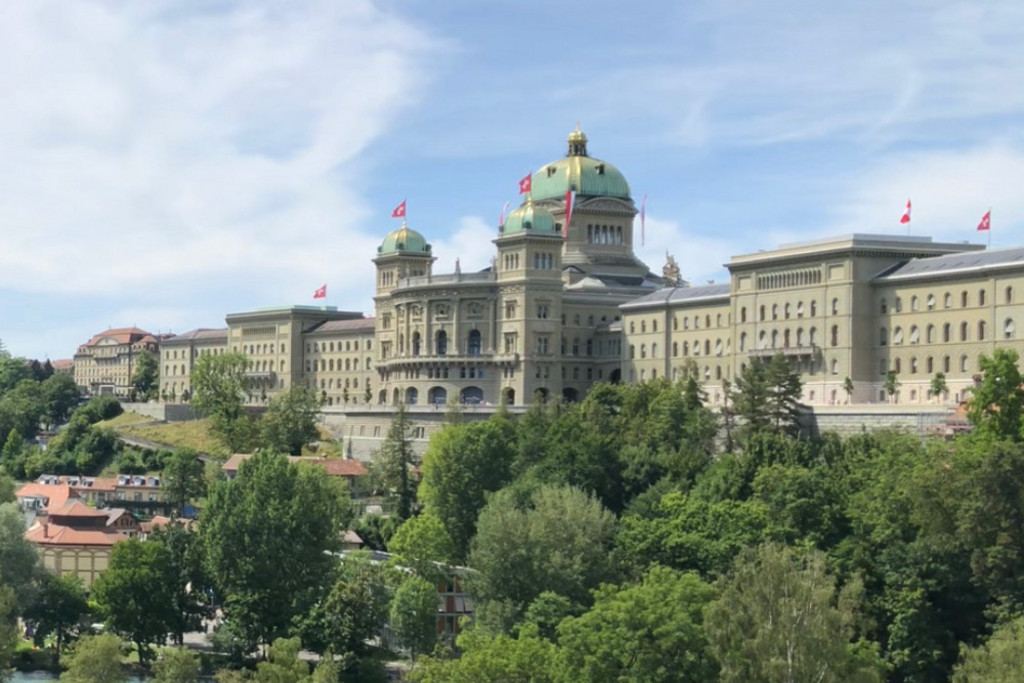Pierre Maudet, the FDP cantonal councillor for Geneva, announced the surprise move to the media on 21 February accompanied by a senior official from the State Secretariat for Migration (SEM). The plan, dubbed Papyrus, aims to tackle illegal employment by giving legal status to thousands of undocumented immigrants working in the local economy. There are an estimated 18,000 such people in the canton and 76,000 nationwide. Zurich is home to the highest number of them, at 28,000.
Piloted for two years in strict confidence, the initiative was negotiated between Pierre Maudet and Federal Councillor Simonetta Sommaruga, who is responsible for immigration issues. During this time, Papyrus regularised 590 people by granting them a B permit on humanitarian grounds, renewable annually.
Offices inundated
The news came as a bombshell to the undocumented immigrants living in Geneva, a canton which has some 30,000 domestic employees. Almost 2,000 people attended an information meeting held by self-help organisations on 26 February. The branches of this collective have opened information offices – at a rate of six a week – to support potential applicants in compiling the necessary paperwork. According to the Support Collective for Undocumented Workers, more than 1,600 people flocked to these offices in just two weeks. “Some of the applicants fail to meet the requirements, mainly because they haven’t spent enough time here or because of debts,” says Alain Bolle, the Director of the Protestant Social Centre (CSP). About 30 % of requests meet the criteria, he added.
Applicants must prove that they are financially independent, do not receive welfare benefits and have lived in Switzerland for at least ten years (or five if they have children). The CSP estimates that a single person paying 1,500 Swiss francs for health insurance and an apartment would have to earn at least 2,500 francs.
Declaring workers
The applications for official status require the workers to name their employers. The government and trade unions want companies and individuals to put their affairs in order and stop employing workers illegally. This reflects one of the aims of the authorities, namely to clean up the domestic service sector, which is the biggest employer of undocumented workers on the labour market. The unions say they will report to the authorities any employer who sacks workers for applying for regularisation. A study commissioned by the SEM found that one in every two undocumented immigrants in French-speaking Switzerland has an AHV number, compared to just one in five in the German-speaking parts, and almost none in the tourist cantons.
“The idea of granting permits on humanitarian grounds comes in response to a precarious, untenable situation,” says Rémy Kammermann, a CSP lawyer. He says that some people – especially women – are living without any welfare protection and exploited by slum landlords who rent mattresses out at 400 francs a month or, worse still, sexually abuse people who fear expulsion. “These arguments have been met with concern by the government, which does not want lawless areas to develop, thus potentially creating crime hot-beds.”
Former Liberal Cantonal Councillor Martine Brunschwig Graf was present at the unveiling of the Papyrus initiative. In 2005, she proposed a regularisation initiative based, like today’s, on the system of hardship cases as stipulated by the Federal Act on Foreign Nationals. At the time, Christophe Blocher headed the Department of Justice and Police. He chose not to pursue the proposal. “We needed a partner in the federal government. This time it’s Simonetta Sommaruga,” says Brunschwig Graf, who now chairs the Federal Committee against Racism. It should be noted that it is the SEM, not the cantons, which decides whether or not to grant B permits. “The difference with Papyrus is that Geneva has given itself greater scope for agreeing acceptance criteria,” she says.
The Genevan initiative has not gone unnoticed in Switzerland. But Martine Brunschwig Graf does not draw any conclusions from that: “Not all the cantons are ready to introduce such a system. Proper organisation is required. It’s not enough to get a green light from the federal government,” says the former President of the Cantonal Council. In Geneva, Alain Bolle is confident that “Papyrus will have a knock-on effect.” Rémy Kammermann believes German-speaking parts of Switzerland are reluctant to regularise undocumented immigrants because it is seen as somehow “going against the law” in spite of its legality. “Last year, Zurich granted legal status to only two undocumented immigrants, while many German-speaking cantons regularised nobody,” the lawyer explains. The Department of Security in Zurich refuses to confirm estimates that there are 28,000 undocumented immigrants. It explains its policy by referring to the cantonal directive on hardship cases.
Having been approved by the SEM, does Papyrus effectively create a new law at the national level? That remains to be seen, says the Geneva-based lawyer, who expects a great deal from the analysis of the findings of this pilot study in two years’ time. “If the outcome is positive, it will be harder to roll back,” he says.
The economic impact
The fact is that thousands of undocumented immigrants from Africa, Latin America and Asia are fulfilling a demand for workers in Switzerland. “If you really wanted to get rid of these people, you would simply have to post police officers at railway stations in the morning and pick up the people taking the bus to work as cleaners, nannies and handymen in the towns around Geneva,” Alain Bolle says. Conservative politicians are not opposed to this process. FDP Cantonal Councillor Pierre Maudet has “made a name for himself at national level through the Papyrus initiative, and has done so on a potentially contentious issue”, according to a source close to the politician.
Papyrus has only provoked opposition from one corner: Geneva’s Swiss People’s Party (SVP), which believes the move “sends out a disastrous message”. SVP National Councillors Yves Nidegger and Céline Amaudruz have submitted two motions to the National Council. The first seeks to specify and therefore reduce the exceptions for hardship cases. The second calls for Papyrus to be halted until these specifications have been made. Could these motions cast doubt over the experiment in Geneva? “There is no chance of that happening because it would mean amending the law itself,” says Alain Bolle. He is pleased that Papyrus was kept “under the radar because it might otherwise have been undermined by the SVP”.
The Papyrus effect reverberates across Basel and in the Jura
At the end of March, the far left in Basel called on the government to define the regularisation criteria more objectively. “We were able to relax these criteria in 2017 to allow them to be applied not only to the sick and to families but also to unmarried individuals,” explains Fabrice Mangold from the Basel office for undocumented immigrants. The collective welcomes the Genevan decision, which is says “shows that the SEM can help cantons seeking to establish a transparent procedure”. Basel-Stadt regularises six or seven undocumented immigrants a year out of a total of about 4,000.
In Jura, which has “only a few dozen illegal immigrants, or several hundred at most”, according to a socialist politician, left-wing parties have submitted a motion to the cantonal parliament calling on government to follow the Papyrus initiative. In Vaud, SolidaritéS demanded that the Cantonal Council contact the SEM to discuss the issue of regularisation. The proposal was rejected by 71 votes to 60.
Picture Hundreds of illegal immigrants attended an information meeting in February about the Papyrus initiative, organised by trade unions and the associations affiliated with the Support Collective for Undocumented Workers. Photo: Keystone






![[Translate to en:]](/fileadmin/_processed_/d/2/csm_Revue_202204_Huehnerfarm_SH-Reportage_3074_7901ca94df.jpg)



Comments
Comments :
Tolle Idee, hoffentlich wird dies auch in den anderen Kantonen bald umgesetzt!
Les conditions pour obtenir ce permis sont bien établies et la durée d'une année permet à chaque cas d'être suivi et réévalué.
Ouvrez vos esprits, vos coeurs et votre vie n'en sera que meilleure.
Bravo, l'esclavage n'a pas sa place dans une société moderne!
The whole western world should adopt this
They will also pay taxes!!'????????????????????g
Ces personnes ont l'obligation de chercher 10 offres d'emploi par mois.
En GRANDE PARTIE sans réponse de la part des entreprises malgré la loi.
A quand un programme à l'intention des jeunes de notre pays en difficulté??